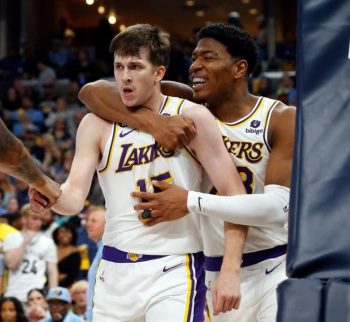NBA
NBA PM: David Stern Talks Race and the NBA

Stern and Race in the NBA
There’s no question that race issues are on the tip of every Americans’ tongue these days thanks in large part to the recent Ferguson and Eric Garner rulings, but former NBA commissioner David Stern recently spoke with Big Think, a website that serves as a platform for intelligent conversation on a number of topics, and spoke about how far the NBA has come in regard to race over the course of the last 40 years.
“Our business focuses us on diversity because we all work in a sport that was deemed ‘too black’ to thrive and actually even survive,” Stern said.
“People forget, but there were articles about ‘the dark clouds over the NBA.’ When I was executive vice president, (then-commissioner) Larry (O’Brien) sent me up to a newspaper, and the television guy said, ‘You don’t get it, Stern. You guys are just not going to make it. This is a white country and you have a black sport.’ So we developed a chip on our shoulders very early on.”
Obviously, the NBA is a place where race really hasn’t come to matter. It is arguably the most international of any of the “Big Four” American sports, and that started nearly four decades ago with basketball providing both white and black stars at a time when a lot of people didn’t think such a thing was possible on so wide a scale.
“If you worked for the NBA in the ‘70s, you had to be a believer that America was a good country, and that we had something to teach rather than to be afraid of,” Stern said.
“A sport that could have Willis Reed from Louisiana and Grambling and Bill Bradley from Crystal City, Missouri and Princeton on a championship team? That says something about a sport that has something to teach. That’s about talent.”
To this day, it’s still about talent, and teams have found talent in players of all different races, creeds and nationalities. Diversity is everything for the NBA, not only for players but fans, as well.
“We sort of rallied around the notion that if you came to an NBA game, it didn’t matter where you sat, whether you were in the nosebleed section or at courtside, your opinion counted regardless of your race,” Stern said. “And if you were on the court, your talent counted regardless of your race. If you’ve got game, you play. If you don’t have game, you don’t.”
Over 50 years after Martin Luther King, Jr.’s “I Have A Dream” speech, race is still a huge issue in America, but American sports—the NBA in particular—have done a lot to get ahead of that curve. Clearly, matters of racism and prejudices and privilege are far from over, but for former commissioner Stern, it must be gratifying to sit back and appreciate the progress that his basketball league has seen over the course of his career in professional hoops.
Hopefully the rest of the world catches up soon.
Emmanual Mudiay’s Immediate Future Up for Grabs
Anybody that saw Duke topple the second-ranked Wisconsin Badgers earlier this week knows that NBA scouts are drooling over Jahlil Okafor as a potential No. 1 pick in this upcoming summer’s draft, but he’s anything but a shoe-in, especially with talented point guard Emmanuel Mudiay expected to throw himself into the pool of potential draftees this spring, too.
Mudiay, who had originally committed to Southern Methodist University to play under storied head coach Larry Brown, ultimately backed out of his commitment before the start of the NCAA season to take a $1.2 million deal with the Guangdong Southern Tigers of the Chinese Basketball Association, mostly due to academic shortcomings and financial necessity.
His time in China was intended to show NBA scouts what he can do on a professional level while still earning money for his family, however a recent ankle sprain has his future with the team looking a little cloudy, according to Adrian Wojnarowski of Yahoo! Sports.
Mudiay has missed his last four games with the sprain, which was enough to force Guangdong to go out and sign former NBA point guard Will Bynum to replace him.
There is no way of knowing whether or not this is a permanent move, but as is the case with a lot of international leagues, only one American player is allowed on a CBA roster at a time. Bynum could serve as a potential short-term solution, or Guangdong could release Mudiay and pay him the remainder of his contract after only 10 games with the team.
In those 10 games, Mudiay has averaged 17.7 PPG, 6.0 RPG and 6.0 APG, more than enough to get NBA teams interested him as a prospect, but there’s good reason to believe that Mudiay could shut it down and look toward staying healthy the rest of this season so he can rehab, train and get himself 100 percent healthy by the time the combine rolls around in May.
His leaving China early could also serve as an instance of him quitting while he’s ahead. His numbers so far have been good, so there’s little reason for him to put together a larger sample size that could potentially expose weaknesses.
Whatever he does, Mudiay is a likely top-three pick come June. The Guangdong Southern Tigers might not be particularly happy about how it’s all playing out, but Mudiay’s camp has no reason to be anything but thrilled.














